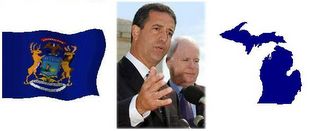Principled Leadership
Anyway, I love books like these. I was struck, however, by a passage I read earlier (on page 122, for those with a copy of the book). Regarding then-Congressman Lincoln's opposition to the Mexican-American War. Although he entered the House of Representatives after the fighting was over, when pressed to take a stand, he voiced his opposition to it, despite knowing that the war was popular with his constituents and the country as a whole. As would be expected, this hurt Lincoln politically.
... Compelling as Lincoln's criticisms might have been, they fell flat at a time when the majority of Americans were delighted with the outcome of the war. The Democratic Illinois State Register charged that Lincoln had disgraced his district with his "treasonable assault upon President Polk," claimed that "henceforth" he would be known as "Benedict Arnold," and predicted that he would enjoy only a single term. Lincoln sought to clarify his position, arguing that although he had challenged the instigation of the war, he had never voted against supplies for the soldiers. To accept Polk's position without question, he claimed, was to "allow the President to invade a neighboring nation . . . whenever he may choose to say he deems it necessary."(bold emphasis mine)
Sound familiar, anyone? Naturally, my thoughts turned to Senator Russ Feingold, who is himself known for principled, politically unwise votes. Of course, the most natural connection to make would be that Senator Feingold voted against the Iraq War but for the infamous $87 Billion that posed problems for Senator Kerry.
It's also interesting to see that although the conservatives are with the Republicans now and the progressives are with the Democrats, conservative rhetoric (ie. "treasonable assault") hasn't changed at all. Indeed, Senator Feingold, the only one at the time with a plan for Iraq, had his position totally misrepresented countless times.
For those who haven't read the book, or who don't know the history behind the Republican nomination battle in 1860, no one expected Abraham Lincoln, an unknown, one-term ex-congressman to win. The "presumptive nominee" was New York Senator William Henry Seward, and Ohio Governor Salmon Chase and Missouri Judge Edward Bates were both considered strong possibilities. But Lincoln, through taking principled stands on the issues, speaking eloquently and passionately on them, and by building a network of support going into the 1860 convention, surprised the nation by winning the nomination and the White House.
Now, am I saying Russ Feingold is a modern Lincoln? No. But as Mr. Lincoln showed in 1860, sometimes the impossible happens, when a person of strong character is in the right place at the right time. As in 1860, in 2008 the presumptive nominee is a certain New York Senator. And there's also a man of strong character coming out of the Midwest, who I think will surprise a lot of people.
Anyway, it's amazing what we can learn from history.




0 Comments:
Post a Comment
<< Home